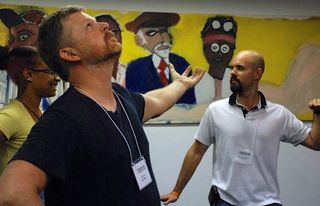Play
What’s the Opposite of Play?
It's time we started to appreciate play for what it does for our mental health.
Posted April 5, 2016
Surprise! The opposite of play is not work. In fact, work and play can be more similar than we think. We can—and many do—work playfully. And we can—and do—often play in ways as structured and as serious as we work.
According to pioneer play researcher Brian Sutton-Smith, the opposite of play is depression.

That’s because, he says (in his classic 1997 book, The Ambiguity of Play), play involves “the willful belief in acting out one’s own capacity for the future.”
I agree. Among its many benefits, play helps us belong, and belonging helps us move about and around feeling alone, isolated and victimized. Playing is how we become part of existing communities—the human community, first and foremost, and the thousands of communities, large and small, that humans create. We become part of communities (of grown ups, parents, movie goers, social media bloggers, gamers, dieters, cooks, partygoers, even loners) by imagining ourselves to be competent members of those communities and creatively imitating others—in other words, by playing at being members before we knew how.
Sutton-Smith and I are far from alone in promoting play as an essential activity for an emotionally healthy life. There are thousands of us out there. Most don’t get heard enough. Doing my part to change that, I invite you to watch two short videos.
The Decline of Play is a TEDx talk by psychologist and play advocate Peter Gray. He links the dramatic decline in children’s play over recent decades with the dramatic increase in anxiety, depression, feelings of helplessness, suicide and narcissism in children and adolescents.
Approaching Autism Theatrically is a TEDx talk by Stephen Volan from Bloomington, Indiana. Stephen describes his life as a person with autism before, during and after taking improv courses, which helped him discover that play means “playing along.”
And…if you have 12 more minutes, please take a look at my TEDx talk—Play Helps Us Grow at Any Age—where I show how we can play with the hard and painful stuff of life.
Would love to hear your feedback.


